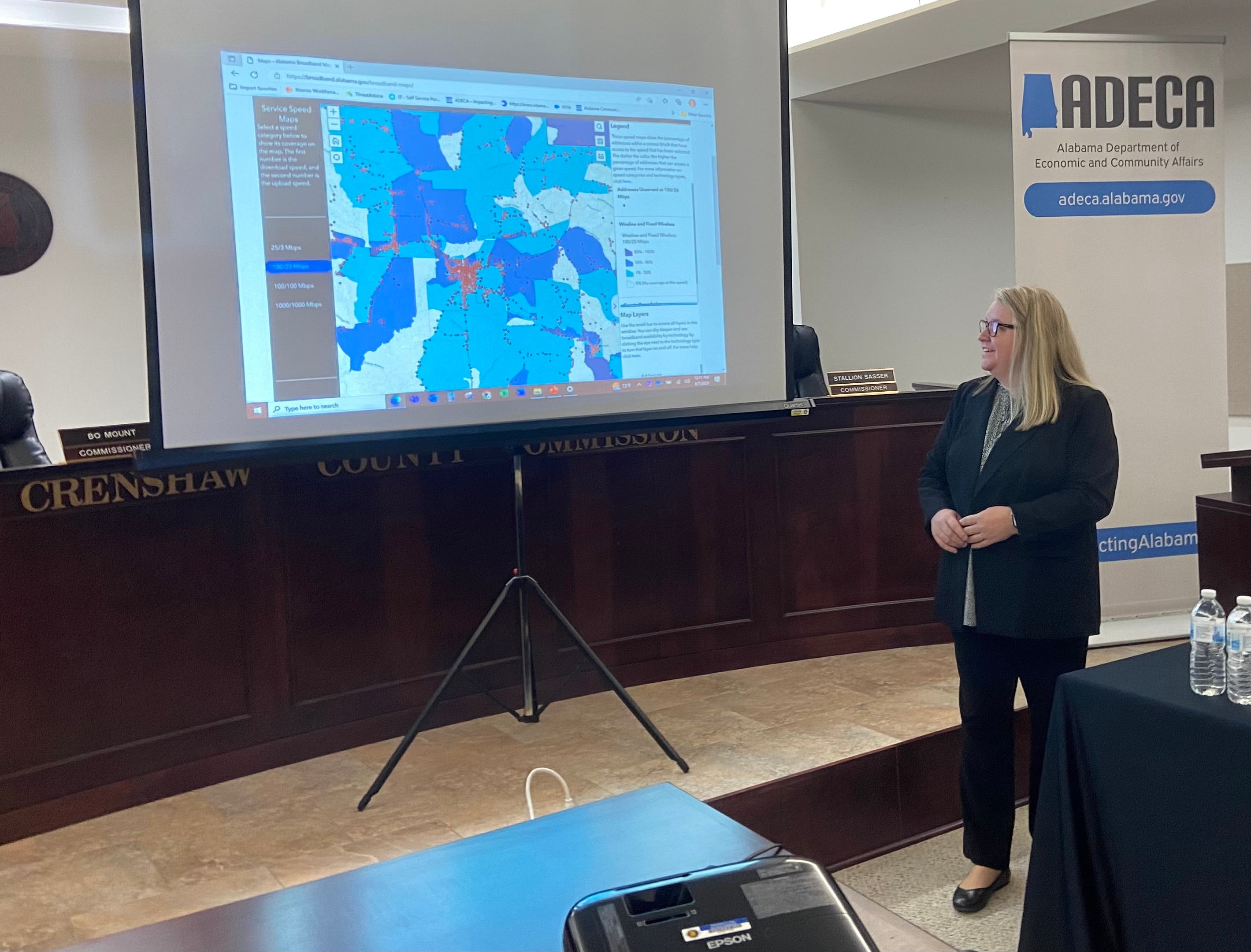ADECA discusses Broadband concerns in Crenshaw County
Published 7:22 pm Thursday, March 16, 2023

- Alabama Department of Community Affairs (ADECA) Digital Expansion Division Unit Chief Dorothy May, discusses how the Alabama Broadband Map, a statewide ADECA initiative to peer deeper into our state’s digital divide, will assist in bringing broadband internet to underserved and unserved citizens in Crenshaw County.
By Haley Mitchell Godwin
The Alabama Department of Community Affairs (ADECA) Digital Division held a meeting in Luverne on March 7 to gather information about Crenshaw County’s digital divide and discuss the Alabama Community Broadband Technical Assistance Program (TAP).
ADECA’s Digital Expansion Division Unit Chief Maureen Neighbors and Dorothy May, Digital Expansion Division program supervisor, conducted the meeting inside the Crenshaw County Commissioners courtroom, and emphasized that broadband is no longer a luxury but a necessity for education, health care, and economic development.
The meeting was one of the first of 67 county meetings in response to Alabama Governor Kay Ivey’s effort to bring statewide broadband service to even the most rural Alabama areas through the ADECA administered TAP initiative.
At the meeting, Neighbors and May discussed federally funded programs intended to help close the gaps in broadband coverage, and engage citizens, government officials, internet service providers, and community organizations in a conversation about the importance of quality broadband service and access, and the related challenges that exist in the county. ADECA representatives shared information about available opportunities and listened while local leaders described their perspectives and experiences.
Representatives from ADECA learned that many Crenshaw residents live in areas that are not serviced by any internet service providers (ISPS) and other residents have very few, or no options and are often stuck with extremely unreliable, outdated DSL internet.
According to those present, without broadband access, people are unable to access information, apply for jobs, or participate in online learning opportunities and this lack of access can have serious consequences for the economic development of rural areas like Crenshaw County.
One discussion related to the need for collaboration between different stakeholders in order to solve the problem of broadband access.
Chad Copeland, vice president of home services with C Spire, formerly Troy Cable, spoke about the importance of working together and pooling resources to find solutions that meet the needs of everyone in the community.
“It’s always great when we can work together,” Copeland said. “We’ve worked with most everybody in the room in some capacity. If you (other ISPS) have areas we can touch, or help you figure out, if we can partner together, in any way, let us know. If you have something we can help you look at or if you are just trying to get some research done, feel free to reach out to us.”
The meeting addressed some of the challenges that exist in bringing broadband to rural areas. For example, the cost of building out infrastructure in sparsely populated areas can be prohibitively expensive. Additionally, some residents may not be able to afford the monthly cost of internet service, even if the infrastructure is in place.
Reverend Raymond Franklin spoke on behalf of the Helicon community and expressed his concerns about broadband affordability.
“We can only get internet from one company and the rates are so costly that some people in my community cannot afford it,” Franklin said. “I see in the handout that a federal assistance program is discussed. We do have great quality internet, but the price is a big issue to many.”
Neighbors addressed Franklin’s concerns, providing information on TAP and the Affordability Connectivity Program (ACP) , a subsidy that can significantly lower internet bills for those that qualify.
Providers that service the county were invited to the table to present information and most attended except Brightspeed Internet. Ashley Hataway, accounting manager at Covington Electric, discussed plans for her company’s broadband service, Buzz Broadband. Hataway stated that by late summer Buzz Broadband should be available to citizens receiving power from Covington Electric, adding there are plans to extend the broadband service to those outside of the co-op service area.
Although it may be several more years before residents see a wide expansion of broadband services, collaboration emerged as a key factor for addressing the issue at hand. May stressed the importance of stakeholders continuing to work together to develop solutions tailored to the needs of each community and ensure that no one is left behind in the digital age.
“This is not an immediate solution,” May said. “We are just getting started but all of this gathering information and planning is necessary so that we can develop county profiles and get an accurate depiction of what we have here and where the needs are. We will come back with a county profile and invite the ISPs to the table to sit down with elected county officials to discuss the problems and ask the ISPs to give us their best proposals on how to fix this.”
The meeting ended with a public comment session. Attendees shared experiences with unstable internet access in rural areas, with some stating that they were unable to access online resources for education or healthcare and noted the economic impact caused by businesses struggling to compete in a digital market.
For more information, visit www.broadband.alabama.gov.





